Press Poisoners in Ireland and Other Articles
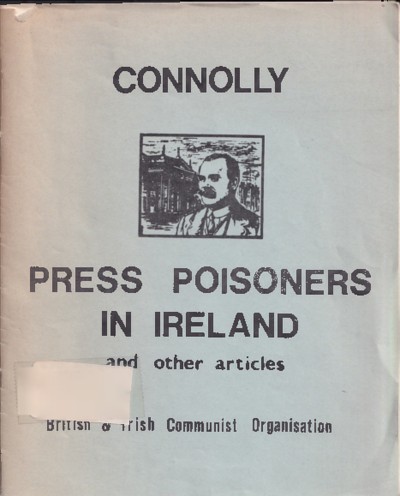
| Date: | May 1972 |
|---|---|
| Organisation: | British and Irish Communist Organisation |
| Edition: | 3rd |
| Author: | James Connolly |
| Type: | Pamphlet |
| View: | View Document |
| Discuss: | Comments on this document |
| Subjects: |
Please note: The Irish Left Archive is provided as a non-commercial historical resource, open to all, and has reproduced this document as an accessible digital reference. Copyright remains with its original authors. If used on other sites, we would appreciate a link back and reference to The Irish Left Archive, in addition to the original creators. For re-publication, commercial, or other uses, please contact the original owners. If documents provided to The Irish Left Archive have been created for or added to other online archives, please inform us so sources can be credited.
Commentary From The Cedar Lounge Revolution
13th February 2023
Many thanks to Conor McCabe for scanning and forwarding this to the Archive.
This document reprints three articles by James Connolly: Press Poisoners in Ireland, The Irish Nationalist Press and The Awakening of Ulster’s Democracy. It was published in three editions, the second in June 1968 and the 3rd in May 1972.
While the articles are of considerable value in and of themselves in terms of building a sense of Connolly’s output in the round, the Introduction offers a rationale for the publication. This notes that:
When the British and Irish Communist Organisation first became involved in Irish working class politics, in accordance with its adoption of Lenin’s slogan that ’’without a revolutionary theory there cannot be a revolutionary movement”, it was a prime necessity that it study and evaluate the writings of the one socialist theoretician of substance that had emerged from the Irish working class, James Connolly. It soon became clear that there were a great many obstacles to doing so.
Although four volumes of Connolly’s selected writings had been edited by Desmond Ryan and Cathal 0’Shannon and published in the late forties, when the B & ICO actually studied the original socialist newspaper files of the Connolly period, it came across many articles which could be described as among Connolly’s best but which had been carefully omitted from the selected writings which were republished by Ryan.
And:
The contents of these articles made obvious the reasons for their suppression. The Ryan editions were tailored to include only those writings of Connolly which would reduce any offence to the Irish catholic bourgeoisie to a minimum, whereas Connolly’s suppressed writings contained his most bitter attacks on that class.
The Introduction argues that:
When the B & ICO first made a number of Connolly’s suppressed writings available, it had not yet freed itself from the Catholic nationalist myth of “one historic Irish nation”, and accordingly held a catholic nationalist anti-partitionist position. Arising from this, not alone were Catholic nationalist deviations in Connolly’s republished articles left uncriticised, but a number of catholic nationalist errors were also contained in the introductions to these writings supplied by the B & ICO. In due course through careful historical analysis and a clearer understanding of the realities of the political struggles in Ireland today, the B & ICO came to the conclusion that there were two nations in Ireland and that anti-partitionism was an undemocratic attempt to deny the right to self-determination to the Ulster Protestant nation.
And:
Primarily because of the errors contained in the B & ICO introductions to its editions of Connolly’s writings, these were withdrawn from publication in late 1971. This, caused much glee in opportunist circles, but they can wipe the smile off their faces now with the republication of these articles.
It criticises Connolly, in part, from a position outlined in the following:
Despite, the fact that Connolly held a catholic nationalist position on Ulster, he himself was at pains, in “The Awakening of Ulster Democracy”, to expose the real nature of such ’sympathy’ for Labour on the part of the catholic bourgeois nationalists.
It would be interesting to return to those earlier editions to see how the B&ICO analysis shifted across this short period of time.
A very useful addition to the Archive.
More from British and Irish Communist Organisation
British and Irish Communist Organisation in the archive
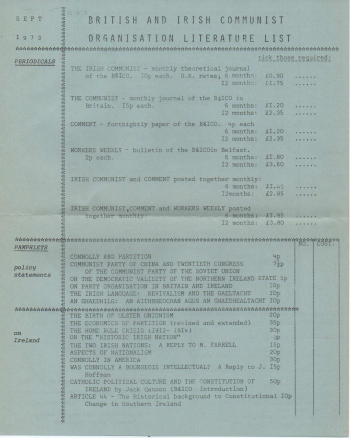
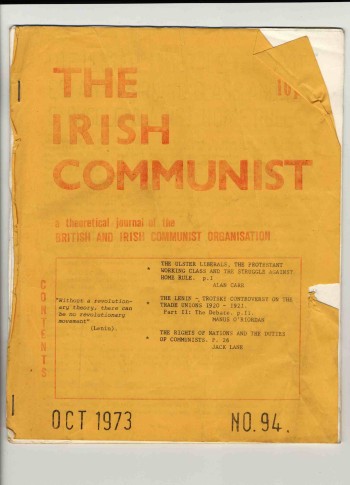
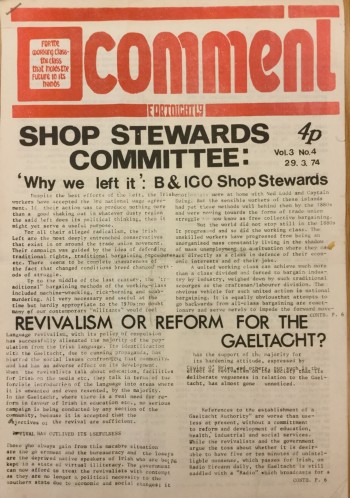
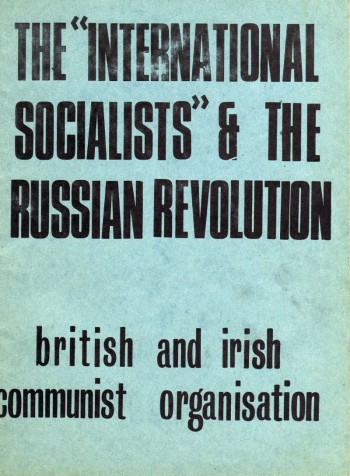
Comments
No Comments yet.
Add a Comment
Comments can be formatted in Markdown format . Use the toolbar to apply the correct syntax to your comment. The basic formats are:
**Bold text**
Bold text
_Italic text_
Italic text
[A link](http://www.example.com)
A link
You can join this discussion on The Cedar Lounge Revolution
By: Sarah Mon, 13 Feb 2023 17:00:16
BICO was a poison. Revisionist Stalinists. They haven’t gone away, you know.
Reply on the CLR
By: WorldbyStorm Mon, 13 Feb 2023 17:03:04
In reply to Sarah.
It’s amazing their turn in the 90s or so into Aubane.
Reply on the CLR
By: Sarah Mon, 13 Feb 2023 17:06:50
In reply to WorldbyStorm.
Well, some of them turned, that’s true. Though some of the revisionist Stalinists are still around, I could mentioned a certain well-known historian of the labour movement…
Reply on the CLR
By: WorldbyStorm Mon, 13 Feb 2023 19:17:10
In reply to Sarah.
Did the Aubane crew really gave up on revisionism either – or did they just eventually shed their (early) Neo-Unionism for a sort of reworked nationalism. Revisionist Stalinism and indeed non-revisionist Stalinism is certainly a strand about and around.
Reply on the CLR